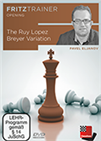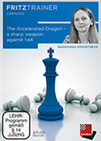Photo finish
From August 20th to 28th, the Spanish Championships for men and women took place in Linares, Jaén. All the players participated in the same 9-round Swiss open, with the best woman placed in the final standings declared the winner of the female section. No fewer than 125 players participated. The top three highest-rated competitors were David Antón, Iván Salgado and Manuel Pérez Candelario, all of them with a 2600+ rating. Francisco Vallejo was absent, as he will be from the Olympiad team for personal reasons.
The Championship had a clear leader from rounds one to seven — Jose Cuenca was on 6½/7 after defeating the eventual champion (Gabriel) Salvador del Rio de Angelis. It looked like it was a closed deal for the player from Granada, as he was a full point ahead of the field with only two rounds to go. Round eight, however, saw him lose for the first time in the event, against the Catalonian IM Hipólito Asis. Asis took advantage of a small structural advantage, which he achieved from a Scotch Opening:
 On this 60 Minutes renowned and successful coach Adrian Mikhalchishin gives simple practical tips how to neutralize and counter the Scotch.
On this 60 Minutes renowned and successful coach Adrian Mikhalchishin gives simple practical tips how to neutralize and counter the Scotch.
Del Río, Candelario and Cuenca | Photo: Patricia Claros
Three players that were on 5½/7 jumped into contention by winning their eighth-round games, making it a four-way tie before the final round. Besides Asis, Levan Aroshidze and, of course, Gabriel del Rio de Angelis joined the leading pack — they did it by defeating two younger opponents, Jaime and Miguel Santos, respectively. The final positions in these two encounters are curiously similar — in both cases, the vulnerable black kings fall prey to White's well-coordinated pieces:
 Pavel Eljanov explains in depth what Gyula Breyer already saw in 1911 and what became an opening choice of the likes of Kasparov, Kramnik, Anand or Carlsen. The Breyer Variation, which is characterised by the knight retreat to b8.
Pavel Eljanov explains in depth what Gyula Breyer already saw in 1911 and what became an opening choice of the likes of Kasparov, Kramnik, Anand or Carlsen. The Breyer Variation, which is characterised by the knight retreat to b8.The stage was set for an exciting final round. Co-leaders Asis and Del Río faced off on the first board, while Cuenca and Aroshidze were paired against lower-rated players on boards 2 and 3. Asis and Del Río de Angelis signed a 22-move draw. Aroshidze had a knight for two pawns in a difficult endgame with queens on the board, while Cuenca missed a chance to recover from his previous misstep. This was his position against IM Angel Espinosa:
Cuenca went for the immediate 38.Rc8+, when Black was able to answer with 38...Re8, blocking the check. The computer gives 38.Rc7 as winning, as Black now needs to move the queen away with 38...Qd3. After 39.Rc8+, Black cannot block with the rook and has no way to avoid the white queen from penetrating with 40.Qc7. White would play Qb8 later and the mating threats would be decisive.
In the game, more exchanges followed and Cuenca had to settle for a draw after 45 moves.
On board 3, Aroshidze found himself in a drawn endgame and signed the peace treaty on move 48. Therefore, all the co-leaders had added half-points to their tallies, so things would be decided according to tiebreaks criteria. Gabriel del Rio de Angelis was declared the champion, Jose Cuenca finished second and Hipolito Asis third. A result no one could have predicted after round seven!

Cuenca beat Del Río in round seven, but finished in second place nonetheles | Photo: Patricia Claros
Sabrina Vega triumphs amongst the women
In 2016, FEDA (the Spanish Chess Federation) decided to organize a single event to determine the champions in both gender sections, after having had separate tournaments in previous editions — the strongest Spanish female players had argued strongly in favour of playing separately and finally achieved their goal. The Federation, however, mentioned that this was a provisional decision, asserting that there were complications with scheduling in a year where an Olympiad was to be played.
 After 1.e4 c5 2.Nf3 Nc6 3.d4 cxd4 4.Nxd4 g6! leads to the so-called "Accelerated Dragon Defense". On this DVD the Russian grandmaster and top women player Nadezhda Kosintseva reveals the secrets of her favourite opening.
After 1.e4 c5 2.Nf3 Nc6 3.d4 cxd4 4.Nxd4 g6! leads to the so-called "Accelerated Dragon Defense". On this DVD the Russian grandmaster and top women player Nadezhda Kosintseva reveals the secrets of her favourite opening.One of the strongest female players in Spain, Monica Calzetta, gave us her opinion about this issue:
It is a little disheartening that this discussion about separate women's tournaments is still on the table. To mention key aspects like visibility, promotion, the creation of models for young girls and so on is even more tiring, as the ones that make the decisions are still men, which has kept us in the minority. We [the female players] need to decide.
My favourite model is the one used in France: a closed tournament for the main title [open to men and women] and a closed tournament for women — concurrently, open tournaments are played to see who qualifies for next year's main events. In France, about a thousand players participate in the open events, making it possible for organizers to create the conditions and provide the prizes that the best players in the country deserve, while giving chess the level of prestige it deserves. The key points are prestige and visibility. That way, it will be an attractive event for the players. All the rest of pseudo-scientific discussions lead nowhere.
I also want to say that this prestige I talk about cannot be achieved only by improving women's chess. We need to face this problem as a whole and improve the general image of chess. It should not be that hard. Chess is one of the most fascinating disciplines, and there are a lot of highly interesting people amongst chess players. What happens then? Why are we still stuck in Byzantine discussions? Perhaps — and here I'm not impartial — there should be many more women not only playing but also making decisions, adding their own points of view.

Sabrina Vega during an interview | Photo: Patricia Claros
Five-time Spanish champion Sabrina Vega understands that the current system is prone to produce unfair results in the female section, as the set of players that the competitors are faced against can vary greatly and the tiebreak criteria have too much weight in the final standings. She has other goals in sight, however:
It is true that the women's title might be unfairly decided sometimes. But we need to keep in mind that this is a secondary reward. The main goal should be to finish in the top ten. And when we get that, we should target at getting a woman to win the Spanish [absolute] title.
Sabrina finished on 6/9, ahead of Ana Matnadze on tiebreaks. WFM Liudmila Kolotilina got the bronze.
Monica Calzetta kindly analysed one of Sabrina Vega's victories:

Ana Matnadze is the 2018 Rapid and Blitz Women's Spanish Champion | Photo: Patricia Claros
Final standings (top 20)
| Pos. |
T. |
Name |
Club |
Pts. |
T1 |
| 1 |
GM |
Del Rio De Angelis, Salvador |
VAS |
7 |
2428.7 |
| 2 |
GM |
Cuenca Jimenez, Jose |
EXT |
7 |
2403.2 |
| 3 |
IM |
Asis Gargatagli, Hipolito |
CAT |
7 |
2387.9 |
| 4 |
GM |
Aroshidze, Levan |
CAT |
7 |
2383.0 |
| 5 |
GM |
Perez Candelario, Manuel |
EXT |
6,5 |
2397.4 |
| 6 |
IM |
Teran Alvarez, Ismael |
AND |
6,5 |
2365.0 |
| 7 |
IM |
Espinosa Aranda, Angel |
MAD |
6,5 |
2331.9 |
| 8 |
FM |
Tejedor Fuente, Enrique |
CNT |
6,5 |
2322.3 |
| 9 |
IM |
Merario Alarcon, Andres |
AND |
6,5 |
2268.3 |
| 10 |
IM |
Garriga Cazorla, Pere |
CAT |
6,5 |
2252.1 |
| 11 |
GM |
Santos Ruiz, Miguel |
VAS |
6 |
2407.2 |
| 12 |
GM |
Santos Latasa, Jaime |
EXT |
6 |
2404.9 |
| 13 |
IM |
Cruz Lledo, Pablo |
VAL |
6 |
2321.0 |
| 14 |
IM |
Ladron De Guevara, Paolo |
AND |
6 |
2308.3 |
| 15 |
GM |
Anton Guijarro, David |
MUR |
6 |
2301.0 |
| 16 |
FM |
Serarols Mabras, Bernat |
VAL |
6 |
2299.1 |
| 17 |
IM |
Vega Gutierrez, Sabrina |
CAN |
6 |
2291.2 |
| 18 |
FM |
Domingo Nunez, Ruben |
AND |
6 |
2274.2 |
| 19 |
FM |
Ayats Llobera, Gerard |
CAT |
6 |
2274.1 |
| 20 |
FM |
Lianes Garcia, Marcos |
MAD |
6 |
2265.4 |
All available games
Additional reporting by Nadja Wittmann
Links
























